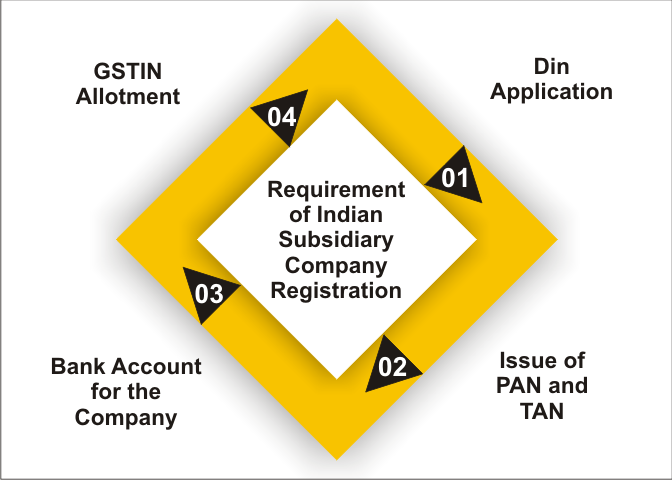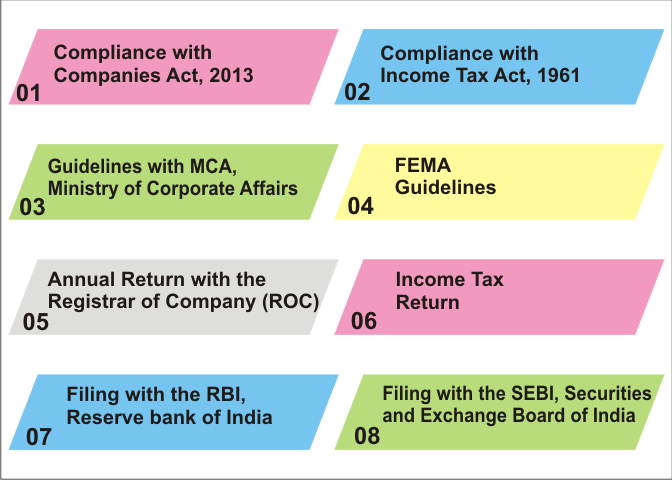Get Started With
servzone
Overview
Many foreign investors are keen to start their business in India as our nation offers many opportunities due to its fast growing market. Any foreign national other than a citizen of Pakistan and Bangladesh or an entity formed and operating outside India, can invest in the Indian market and has the power to form its own subsidiary in India by acquiring shares related to matters of India's FDI policy. is. Before you go through the process of Indian subsidiary company registration, make sure that as a business entity you have at least one Indian director who should be in India and a foreign director to form an Indian subsidiary.
A subsidiary company is also called a sister company and the company which has control over it is called parent company or holding company. The parent company partly or wholly holds the right to control the subsidiary.
The Companies Act 2013 governs the Indian subsidiary company registration process. According to the Companies Act 2013, a subsidiary can be defined as a company in which a foreign corporate body or parent body holds a minimum of 50% of the entire share capital. The parent company has a hold on the subsidiary. A subsidiary is required to follow the laws of the nation in which they plan to establish or are already established. Therefore, if a subsidiary is set up in India, it is important for the company to follow the law in India..
An important point is that a subsidiary of a foreign parent company is considered a separate legal entity and the subsidiary is obliged to operate according to the norms of the country where it is located. Business personnel can register an Indian subsidiary as a private limited company or public limited company.
- A private limited organization is not available to the general population and appreciates the benefits of a public company given by the Companies Act, 2013.
- A public limited company is one where the public has an enthusiasm for it and it is necessary to conform to the various principles and guidelines indicated by the Companies Act, 2013..
Benefits

- Brings Foreign Direct Investment
The Government of India has approved 100% participation of FDI in the case of fast growing business industries; This is to say that FDI is allowed 100% without any foregoing approval. However if you are a partnership firm or LLP or proprietorship then you may need prior approval from the government for FDI..
- Limited Liability
Directors and members of the company have limited liability. They are stringently limited to their company’s share. The limited liability characteristic protects the director or member of the company at the time of any loss or financial crisis bore by the company. The personal property of directors and members will not be endangered due to loss to the company.
- Perpetual Succession
Gradual succession means that no matter for the members or directors of the company, the company will continue to exist. Insolvency, change in members, death, transfer etc. will not have any effect on the survival of the company.
- Scope of Expansion
An Indian subsidiary enjoys all the privileges of a private limited company. Business development and expansion is easy as it raises capital from financial institutions, venture capitalists and investors..
- Borrow Funds
A wholly owned subsidiary in India has the advantage of borrowing money from financial institutions in the form of loans.
- Sue and Sued
Indian subsidiary company acts like a legal person; it can sue and can be sued.
- Obtain Property In India
The foreign subsidiary operates on an independent structure that gives them the right to purchase property in India.
Required Documents
Indian National
- PAN Card information
- Address Proof
- Identity Proof such as Aadhaar Card, Driving License, Voter Id
Foreign National
- Passport
- Address Proof (Indian Consulate must certify the document)
- Identity Proof (Indian Consulate must certify the document)
Other Crucial Documents
- Directors Identification Number (DIN)
- Digital Signature Certificate (DSC)
- Memorandum of Association (MOA) and Article of Association (AOA)
- No Objection Certificate from the person who owns the property of business place
- Certificate of Incorporation granted by the foreign government
- Residential Proof
Characteristics
- Beforehand approval is not required for the repatriation dividend
- Indian subsidiary companies follow Indian transfer pricing framework
- Union budget 2020 says that dividend distribution tax is nil
Registration Procedure
MCA has introduced a new form to simplify the process of registration. The form is called SPICe+ form and it consists of 2 parts:
PART A
Name Reservation process
PART B
Once Name reservation process is done, it includes all the incorporation application and these are:

The Indian subsidiary company registration process is incomplete without obtaining a digital signature certificate from the certifying authority. DSC is a prerequisite.
- Capital
No minimum capital is required.
- Directors
A subsidiary cannot be formed without a minimum of two directors and one must be a resident of India.
- Shareholders
A minimum of two shareholders is required to form an Indian subsidiary company..
- Equity Shares
50% of the equity share capital should owned by the parent company.
- DIN
Director Identification Number of all Directors is necessary.
Annual Compliances

The Indian Subsidiary Company is no different from any other Indian company and the criteria relating to the Indian company are the same as for the Indian subsidiary. If the applicant company successfully follows the above mentioned procedure with necessary documents then it will receive the COI on time.
How Servzone will help you?


GST Registration

PVT. LTD. Company

Loan

Insurance


